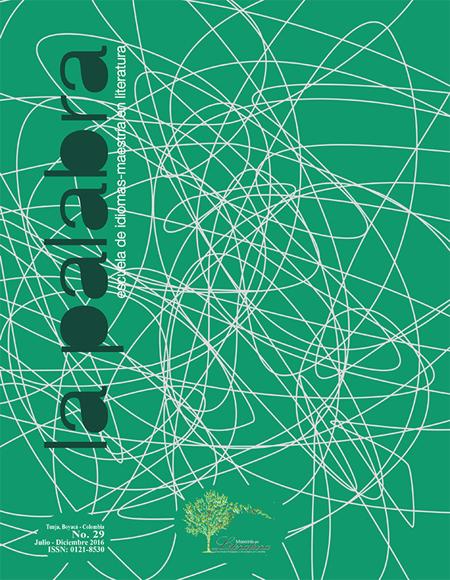Muntu: the Diaspora of African Philosophical Thought inChangó, el gran putas [Changó, the Biggest Badass] by Manuel Zapata Olivella

Abstract
The problem of diasporic phenomena in America is a significant element in Changó, el gran putas . In this novel, the African exodus is related to Muntu philosophy. This philosophy brings together African knowledges composed of diverse elements that reemerge in America, where they are transformed in a context of postcolonial cultural exchange. In Changó , Muntu philosophy allows us to analyze the pos- sibility of creating an alliance between africans and mestizos committed to the freedom of America, at the same time as it becomes a metaphor for American mestizaje ; an opportunity to see the History of this continent from a literary point of view which engages different dimensions of the human being. This study is a reflection about the way in which the different philosopical categories of Muntu (Kintu, Kun - tu, Hantu and Muntu) are developed and ad[a/o]pted from a literary/philosophical perspective, inquiring into their relevance in the work.Keywords
Afrique, mountou, kintou, hantou, kountou, diaspora
References
- Captain-Hildago, Y. (1985). Conversación con el doctor Manuel Zapata Olivella. Afro-Hispanic Review,4(1), 26-32.
- Cunha Júnior, H. (2010). Ntu. Revista Espaço Acadêmico, (108), 81-92.
- Irwin, R., & Szurmuk, M. (2009). Diccionario de estudios culturales latinoamericanos. México, D.F.: Siglo XXI Editores.
- Jahn, J. (1963). Muntú: Las culturas neoafricanas. (J. Reuter, Trad.) México: Fondo de cultura económica.
- Mbiti, J. S. (1969). African Religions & Philosophy. Londres: Heinemann.
- Montenegro De la Hoz, N. (2012). Huellas de africanía y liberación como propuesta ideológica en Changó, el gran putas. La palabra, (20), 77- 87. Recuperado de http://revistas.uptc.edu.co/revistas/index.php/la_palabra/article/view/953/953.
- Montenegro De la Hoz, N. (2014). Changó, el Gran Putas: Formas de Resistencia e Identidad Esclavizada en los Estudios Poscoloniales. La DOI: https://doi.org/10.19053/01218530.2501
- palabra, (24), 59-66. Recuperado de http://revistas.uptc.edu.co/revistas/index.php/la_palabra/article/
- view/2501/2360.
- Songolo, A. (1981). Muntu Reconsidered: From Tempels and Kagame to Janheinz Jahn. Ufahamu: A Journal of African Studies, 10(3), 92-100. DOI: https://doi.org/10.5070/F7103017283
- Zapata Olivella, M. (1987). Memoria de la palabra. Revista de estudios colombianos, (2), 1-2.
- Zapata Olivella, M. (2010). Changó, el gran putas. Bogotá: Ministerio de Cultura.
- Zapata Olivella, M. (2002). El árbol brujo de la libertad. Buenaventura: Próculo Alberto Ramírez, William Mina Aragón.
Downloads
Download data is not yet available.
